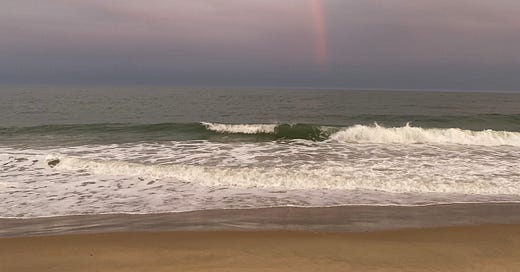A few years ago, I read the book Caste by Isabel Wilkerson with a small group of thoughtful, compassionate white women. We’d been reading other anti-racism books during those early days of the pandemic when everyone was at home being introduced to Zoom meetings. But the stories in Caste hit us powerfully, much more so than the other books we’d read. We had trouble sleeping thinking about the pain, injustice, intolerance, and cruelty that was embedded in our American experience. We made a rule: don’t read the book after 4 p.m.
We wanted to hear, to know, to understand so that we could move forward in a way that amplifies those unheard voices and moves toward correcting centuries-long systematic injustice.
But we also needed to sleep.
I’m feeling the same now. Anger. Deep empathy. And hopelessness. Part of me wants to look away. To hide under the covers and read a romance novel.
There’s a particular privilege in being able to step back. I can take a break from the news. I can choose not to read certain stories after a certain hour. That’s a luxury, because some people can’t opt out. Some people are living inside the very systems I’m disturbed by. There’s no pause button when the cruelty of racism, transphobia, or poverty is directed at you.
I don’t want to opt out. I want to stay awake, to stay present. But I know it doesn’t do me … or anyone else … any good to get so overwhelmed I shut down. This is where the image of the ocean helps me.
The ocean doesn’t crash against the shore all day. It moves in rhythm. It rises. It recedes. But it never leaves. That rhythm – of coming close and pulling back – is how the ocean endures.
What if staying emotionally present isn’t about bracing ourselves against the tide, but learning to move with it? To rise and return with intention, in rhythm with our own capacity?
There is a wave rising in this country … and across the world. It’s not just a protest or a moment. It’s a movement formed by millions who are stepping in, speaking out, and standing up, not only for themselves, but for others.
This wave is made of compassion and also of righteous anger, of hard truths, and a refusal to look away. It carries the strength of people who are choosing, every day, to align their lives with what they believe matters most.
We don’t create this wave. It’s already moving. But we do have a choice. We can walk away and find a beach chair, watching from a safe distance. Or we can step into the current and offer our hands, our voices, and our courage to something greater than ourselves.
Love is calling us with a whisper, a tug, a roar – a knowing deep inside us that our lives are bound to one another. That the dignity of someone we’ve never met matters. That everyone’s life matters.
The wave moves with or without us… but it changes – gets stronger and more powerful – when we join in.
In past episodes, I’ve talked about the human tendency to look away and self-protect. We convince ourselves it’s not our job; that someone else will step in. Those are understandable, deeply human instincts.
But spirituality – real spirituality – isn’t meant to leave us unchanged.
It isn’t just comfort or beautiful language, nor merely the quiet of a meditation room or an inspiring quote. Real spirituality eventually asks something of us.
And what it asks of us is Love.
Not just inward love – for our own healing, our own unfolding – but love that moves outward. Love that gets its hands dirty. Love that’s willing to be inconvenienced. This is the part of spirituality that doesn’t trend well, the part that can be controversial because it doesn’t look polished or serene. But it’s the part that makes our practice real, because we are now living the things we say we believe.
Loving others is where our spirituality becomes embodied. It’s where our integrity is tested. Not in abstract notions of “oneness,” but in concrete acts of generosity, protection, and truth-telling.
When love becomes active – when it stretches across the boundaries of fear, exhaustion, or difference – something in us expands. Not to bypass pain or forgive harm too quickly, but to insist that the dignity of others is worth defending.
Loving others expands us and is what makes spirituality life-giving. Helping to improve relationships. Helping others to grow. Helping to forgive, not to excuse the past, but to release the future.
And in that way … this expansive love becomes a wave of its own.
Love is Mamie Till, insisting the world see her son’s body – broken by hatred, but not hidden.(1)
Courage in the face of unimaginable grief.
Love is Harvey Milk pleading with closeted gay and lesbian Americans to come out, knowing that visibility could cost them everything and knowing that it might also save someone else’s life. (2)
Solidarity through vulnerable visibility.
Love is the countless ordinary people, later honored as the 'Righteous Among the Nations,' who hid Jews during the Nazi regime – risking death, not because they were fearless, but because they believed in the humanity of those who were being targeted. (3)
Honoring the sacredness of each human life.
Love is scary because we become vulnerable, but the power of love also strengthens and fortifies.
We can join this wave of love.
We can speak up when the story being told isn’t true.
We can correct the joke, challenge the stereotype, and name the harm.
We can donate, show up, and amplify voices that too often go unheard.
We can risk awkwardness. Risk discomfort. Risk being misunderstood.
Love doesn’t ask us to always get it right.
It asks us to try.
This is what active, life-giving spirituality looks like.
Not just slogans. Not just private beliefs.
But love that takes shape in the world.
Rest when you need to. Look away when it becomes so overwhelming you fear shutting down.
Then get up again. Let your life speak. Let your love act.
Love.
Joni Miller, Ph.D., is a writer, researcher, spiritual coach, and speaker who uses her knowledge, education, and love of all things spiritual to help spiritual wanderers find a place they can call home, navigating by the light of Love.
(1) https://www.britannica.com/biography/Emmett-Till
(2) https://www.britannica.com/biography/Harvey-Milk
https://www.history.com/articles/harvey-milk
(3) https://encyclopedia.ushmm.org/content/en/article/righteous-among-the-nations













Share this post